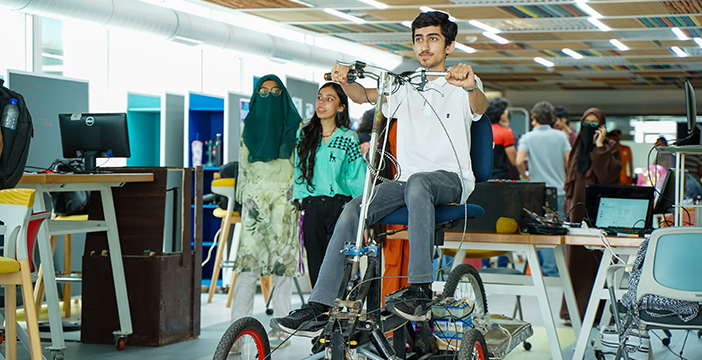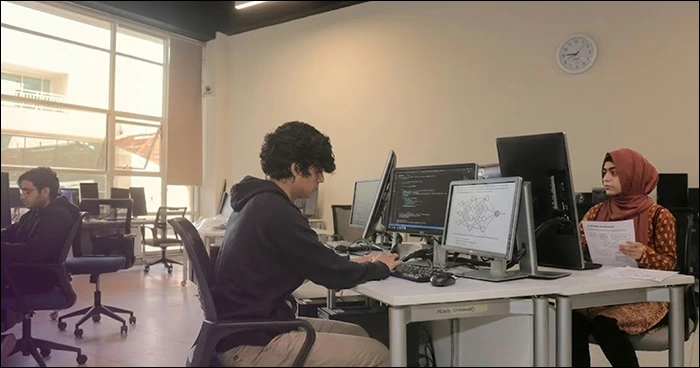What Degree Do You Need to Become a Robotics Engineer?

Behind every self-driving car, surgical robot, or planetary rover is a Robotics Engineer turning ideas into intelligent machines. These engineers don’t just build robots, they give them purpose, precision, and the ability to solve real-world problems.
But what exactly do you need to study to become a Robotics Engineer? If you’re curious about what it takes to enter this field, this guide will walk you through the essential degrees, skills, and steps to launch your career, especially if you’re exploring opportunities in robotics engineering in Pakistan.
The Educational Path to Becoming a Robotics Engineer
To enter the field of robotics, you’ll need at least a bachelor’s degree in robotics engineering or a closely related discipline. Here are some of the most relevant degrees that prepare you for a career in robotics:
1. Robotics Engineering Degree
A Robotics Engineering degree is the most direct and specialized path into the field. These programs typically include coursework in the following areas:
- Mechatronics
- Artificial Intelligence
- Embedded Systems
- Control Theory
- Machine Learning
- Computer Vision
- CAD Design
With a robotics degree, students develop a deep understanding of how to design, test, and implement both the hardware and software components of robots.
2. Mechanical Engineering
Mechanical engineering forms the backbone of any physical robotic system. This degree focuses on the design, analysis, and manufacturing of mechanical systems. To become an engineer in robotics with a mechanical engineering background, you’ll often need to supplement your education with robotics-specific electives or a master’s degree.
3. Electrical or Electronic Engineering
These degrees teach students about circuits, microprocessors, and control systems—all of which are vital to robotic design. Robotics Engineers with this background often work on the electrical aspects of robotic systems, such as sensor integration or motor control.
4. Computer Engineering
A computer engineering program combines software development skills with hardware knowledge. Graduates can excel in robotics because they understand how software interacts with physical components. These programs often include robotics electives or allow students to specialize in embedded systems, automation, or machine learning.
5. Computer Science
Although more software-focused, computer science students can also become Robotics Engineers, especially if they focus on AI, machine learning, and programming languages like Python and C++. However, additional learning in mechanical and electrical systems may be necessary for a well-rounded robotics skillset.
Robotics Engineering in Pakistan

Robotics engineering in Pakistan is gaining traction as both the public and private sectors invest in automation and AI-driven technologies. With the rise of Industry 4.0, manufacturing, agriculture, and healthcare industries in Pakistan are beginning to adopt robotic solutions. As a result, there’s an increasing demand for local talent trained in robotics systems.
Academic Institutions Offering Robotics Degrees in Pakistan
If you’re looking to pursue a robotics degree in Pakistan, several reputable universities offer specialized or interdisciplinary programs that lead to careers in robotics:
- National University of Sciences and Technology (NUST): Recognized as the best university in Pakistan for engineering, NUST offers degrees in mechatronics, mechanical, and electrical engineering with strong robotics components.
- Habib University: Habib stands out for its liberal core combined with cutting-edge STEM education. Its ECE and CS programs emphasize systems thinking, design, and real-world application, which are critical for success in robotics.
- University of Engineering and Technology (UET) Lahore: Offers courses in control systems, artificial intelligence, and automation.
- GIKI (Ghulam Ishaq Khan Institute of Engineering Sciences and Technology): Known for its strong engineering foundation and student-led robotics competitions.
- FAST-NUCES: Offers a computer science curriculum with elective options in AI and robotics.
These institutions provide access to advanced laboratories, student competitions, and research opportunities that are vital for hands-on learning in robotics engineering.
Advanced Degrees and Specializations

While a bachelor’s degree can land you an entry-level job, pursuing a master’s or PhD in robotics or a related field can significantly boost your career prospects. Advanced degrees allow for specialization in areas like:
- Human-Robot Interaction (HRI)
- Autonomous Systems
- Industrial Robotics
- AI and Machine Learning
- Biomedical Robotics
Many Robotics Engineers also earn certifications in specific tools or programming environments, such as ROS (Robot Operating System), MATLAB, or LabVIEW.
Skills You Need Beyond the Degree
A degree alone isn’t enough; Robotics Engineers must also develop a robust skill set, including:
- Programming Languages: Python, C++, Java
- Mathematics: Calculus, linear algebra, statistics
- Control Systems: PID control, state machines
- Mechanical Design: SolidWorks, AutoCAD
- Problem Solving & Creativity
- Communication & Team Collaboration
Internships and robotics competitions are also excellent ways to gain practical experience and build your portfolio.
Career Opportunities for Robotics Engineers
With the right qualifications and experience, Robotics Engineers can work in diverse industries such as:
- Manufacturing and Automation
- Aerospace and Defense
- Healthcare and Medical Devices
- Consumer Electronics
- Agriculture Technology
- Research and Academia
In Pakistan, companies like Systems Limited, LMKT, and even startups in the agritech sector are beginning to explore robotics applications.
How Habib University Prepares Future Robotics Engineers
When it comes to interdisciplinary, innovation-focused education, Habib University is widely regarded as one of the best universities in Pakistan for students aiming to pursue careers in robotics. With cutting-edge programs like Electrical and Computer Engineering (ECE) and Computer Science (CS), Habib emphasizes a blend of technical depth and broad-based learning. Students explore embedded systems, artificial intelligence, control systems, and intelligent machines while engaging in real-world problem-solving and collaborative research. The university’s commitment to interdisciplinary education, merging engineering, design, and social responsibility, prepares graduates to think holistically and build robotics solutions that truly impact society.
Conclusion
Becoming an Engineer in Robotics is a rewarding journey that starts with choosing the right educational path. Whether you pursue a robotics engineering degree or come from a background in computer science, mechanical, or electrical engineering, there are many routes into this exciting field.
The rise of automation technologies means that the future is bright for Engineers, both locally and globally. If you’re passionate about technology and innovation, now is the perfect time to start your journey toward becoming a Robotics Engineer.








